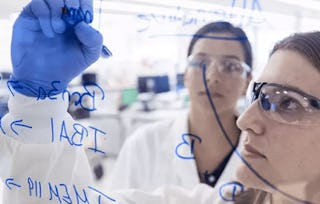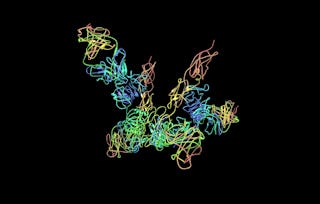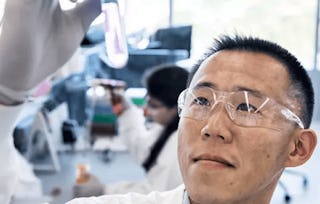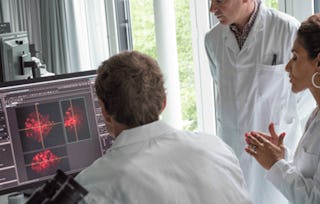What does it take to advance a new drug from the laboratory bench to the patient’s bedside? Historically, drugs were discovered serendipitously and were usually isolated from natural sources. Today, drug discovery efforts take many years and cost hundreds of millions of dollars. They also require the input of dozens of specialists from a multitude of backgrounds to ensure that therapeutic molecules are efficacious and safe.
即将结束: 只需 199 美元(原价 399 美元)即可通过 Coursera Plus 学习新技能。立即节省

您将学到什么
The different stages of drug discovery and development, including the tools and technologies influencing how we think about new medicines.
Investigate drug metabolism, pharmacokinetics and drug safety all the way to clinical development and beyond from the needs of the patient.
您将获得的技能
要了解的详细信息
了解顶级公司的员工如何掌握热门技能

该课程共有4个模块
This week covers an introduction to the drug discovery and development process. It starts off by considering the patient, as the ultimate beneficiary of new and improved drugs, to ensure that they are kept at the centre of and integrated into all subsequent decision-making. Through a case study, the concept of an unmet medical need is introduced and provides a backdrop for understanding further critical concepts which underlie drug discovery and development. An overview of various drug discovery strategies is presented, along with approaches to screening and hit discovery. Various scientific, medical and humanitarian considerations need to be taken into account if effective delivery of new and improved drugs is to be achieved. Some of the challenges are presented, and a panel discussion highlights different, and similar, perspectives in the academic and industry approach to drug discovery projects.
涵盖的内容
9个视频9篇阅读材料2个作业3个讨论话题
This week explores the early phases of drug discovery. As outlined previously, the starting point is always the needs of the patient and their biomedical realities. Understanding disease biology is a critical next step and sets the scene for mapping the context for immune response and the origins of ill health and how the progression of disease can be controlled or arrested. Case studies, particularly in the context of tuberculosis (TB), demonstrate the rationale behind molecular biology studies of the pathogen and the host. Key concepts such as the essentiality and vulnerability of targets and their 'druggability' are introduced. Medicinal chemistry drives the chemical modification of drug-like molecules to improve their activity and safety. The various tools and approaches that the medicinal chemist has at their disposal, including the value of the screening cascade, will be discussed.
涵盖的内容
10个视频4篇阅读材料2个作业1个讨论话题
This week picks up the drug discovery and development story at the point at which promising drug candidates have already been identified. The crucial importance in this phase of investigating the pharmacokinetics and pharmacodynamics of potential drugs is introduced, as these are key parameters for the effectiveness of a new drug and a positive patient experience. These properties have a bearing on bioavailability and metabolic processes and provide a backdrop for animal model studies, and the extent to which the biological properties of the drug are retained in mammalian systems. The ethical considerations and technological advances pertaining to in vivo testing are discussed. Drug testing, safety profiling, and toxicology and efficacy in preparation for clinical trials are presented, and an introduction to process optimization and API manufacturing is also discussed.
涵盖的内容
10个视频4篇阅读材料2个作业1次同伴评审
This week outlines and examines the clinical development phase. Once a drug candidate has successfully progressed through the phases outlined previously, it qualifies for filing as an Investigational New Drug (IND) and a Clinical Trial Application (CTA) and the accompanying review process. An overview is given of the regulatory framework governing this, and a description of the various phases of clinical trials. The extensive teamwork that is required during the clinical trial is outlined, as well as the various role-players in this process, and some of the critical aspects, such as the submission and approval process, protocols that need to be established, informed consent and site management, are described. Finally, we look to the future and consider how new technologies are changing the face of drug discovery and development and how this may ultimately bring newer and safer medicines to the patient more rapidly.
涵盖的内容
10个视频8篇阅读材料2个作业
位教师

从 Basic Science 浏览更多内容
 状态:免费试用
状态:免费试用Novartis
 状态:免费试用
状态:免费试用University of California San Diego
 状态:免费试用
状态:免费试用 状态:免费试用
状态:免费试用Novartis
人们为什么选择 Coursera 来帮助自己实现职业发展




学生评论
107 条评论
- 5 stars
81.30%
- 4 stars
16.82%
- 3 stars
0.93%
- 2 stars
0.93%
- 1 star
0%
显示 3/107 个
已于 Jul 9, 2024审阅
Did not provide answers to my questions over all course was good and instructors are also through the point.
已于 Jul 9, 2024审阅
THIS COURSE ON THE REAL BASIS ENLIGHTED MANY ASPECTS IN DRUG DISCOVERY AND DEVELOPMENT.
已于 Aug 2, 2024审阅
most helpful course to improve the skill in area of pharma field .
常见问题
To access the course materials, assignments and to earn a Certificate, you will need to purchase the Certificate experience when you enroll in a course. You can try a Free Trial instead, or apply for Financial Aid. The course may offer 'Full Course, No Certificate' instead. This option lets you see all course materials, submit required assessments, and get a final grade. This also means that you will not be able to purchase a Certificate experience.
When you purchase a Certificate you get access to all course materials, including graded assignments. Upon completing the course, your electronic Certificate will be added to your Accomplishments page - from there, you can print your Certificate or add it to your LinkedIn profile.
Yes. In select learning programs, you can apply for financial aid or a scholarship if you can’t afford the enrollment fee. If fin aid or scholarship is available for your learning program selection, you’ll find a link to apply on the description page.
更多问题
提供助学金,
¹ 本课程的部分作业采用 AI 评分。对于这些作业,将根据 Coursera 隐私声明使用您的数据。







